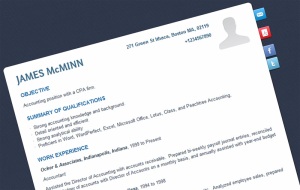There’s probably no document more difficult to assemble for than a résumé. After all, it’s not easy writing about yourself, while simultaneously trying to impress an employer, recollect your past accomplishments, and making the design a little presentable. 
I speak with a lot of friends who are currently on the job hunt, and many of them express frustration when not receiving response from the company, when they were certain they were über-qualified for the role. While there are many reasons a hiring manager may or may not call you back (lack of networking, you really weren’t qualified, the role is already filled, etc.) it’s quite possible your résumé played a part.
Think of it this way: if you were posting a picture on an online dating site to attract potential suitors, you likely wouldn’t have the showcase photo be that one of you passed out the couch after a night of partying (or maybe you would, no judgement.) First impressions are everything.
I could write several posts on résumés alone—and this won’t be the last—but for now, let’s start with the quick and dirty. I don’t expect everyone to be a design genius or a Pulitzer Prize writer, however there are some very basic items that one can quickly review to breathe new life into one of the most important personal documents you own.
1. Stop using Microsoft Word templates.
No, really. They are boring, tired and every employer has seen them a bazillion times. Edit the template to make it your own, run a Google search for free résumé designs or ask a design-savvy friend for help or hints. Make it your own and start standing out.
2. Have fun with fonts.
If you are still defaulting your entire résumé to Times New Roman (or anything that resembles it), then you might as well introduce yourself as the world’s laziest and least creative person to your future employer. Much like those Word templates, default fonts are tired and thoughtless. Sans serif fonts such as Arial, Calibri, Century Gothic, or Verdana, offer a more modern typeface that is still easy to read.
However, I want to caution you not go too far with fonts. Scroll, script or playful choices are a big no-no, as they are not only difficult to read, but do not portray that you are a serious job seeker. My personal favorites are Myriad Pro, ApexNew, Calibri and Helvetica. If you are seeking more fonts outside of those provided on your PC, you can also download free files from dafont.com.
3. Don’t be afraid of white space.
Depending on how many jobs you’ve had, your résumé should only be 1 to 2 pages in length. But that doesn’t mean those pages have to be filled to the brim. White space allows for readability. Employers must be able to easily scan your résumé and digest your career history (company, title, duration), along with your education and skills. Creating margins creates breathing room, so readers can get the gist of your background, and then dig into the details.
For examples of using white space properly, check out the latest format of my résumé.
(please note address and phone changed to protect privacy)
4. Draw ideas and keywords from job postings.
When job hunting, pay careful attention to how descriptions and requirements of roles you want are written and use them in your own résumé. For example, phrases such as “deploys email marketing campaigns”, “manages all end-to-end client projects” or “measures the efficacy of media buys”, or any phrase that matches your responsibilities can be adopted for your own descriptions. However, don’t plagiarize! Pull out the key terms and shape the sentence to fit your own natural language. If you are speaking the employer’s language, along with yours, you’ll more closely fit the bill for at least an interview.
Bonus: use these key terms on your Linkedin profile as well, and you’ll get noticed by employers conducting their own online search.
5. Present accomplishments, not just duties.
When I was about 2 or 3 years into my career, I applied for a new role and was given crucial feedback from the CEO: my résumé only listed what I did, not what I achieved. While not every single thing that you do has a direct outcome worth mentioning, your résumé does need to highlight specific accomplishments. If for example, you list “reorganized office mailroom processes and procedures”, it shouldn’t stop there. Expand upon it by saying “and reduced shipping costs by 30% in the first year.” Employers are not only looking at your skills and background, but what kind of impact you are going to make on their organization.
6. Stop rambling.
Remember that a résumé is a personal marketing document designed to get you the interview. Be succinct in your descriptive language and keep your bullet points to 1 to 2 lines, where possible. Assume that most résumé readers don’t really “read”, but rather skim. Hit on the key points and secure the interview where you can really shine and elaborate. And please, use spell check, I beg of you.
7. Get a fresh set of eyes on it.

Don’t judge me.
Whether it’s your mom, sibling, friend, trusted co-worker, mentor, or significant other, there is at least one person in your life that will look over your résumé as a favor. (Hint: if they have worse grammar than you, avoid them.) Why is this important? There is a reason why writers don’t edit their own books: you’re too involved. An outsider (that is not thinking of hiring you) will give you honest feedback on items you may not have thought of. Extra points if you find help from those who are managers, HR reps, etc. since they are reviewing (and judging) résumés regularly.
8. Keep it up-to-date. (Even when you’re not looking!)
Too often I’ve seen people scramble to assemble a résumé and they simply cannot remember their key accomplishments from 5 years ago (or even 5 months ago.) It’s good practice to update your résumé every few months, whether you’re seeking a change or not. (The same goes for your Linkedin profile.) Not only will you be able to keep a running tab of the items you really want to present on it, but it will be ready to go in a moment’s notice.
No matter what shape your current résumé is in, following a few of these tips will get you on the right path or offer a general refresh of a stale document. Now, take a hard look and a critical eye to your résumé and ask yourself: would you hire you?

